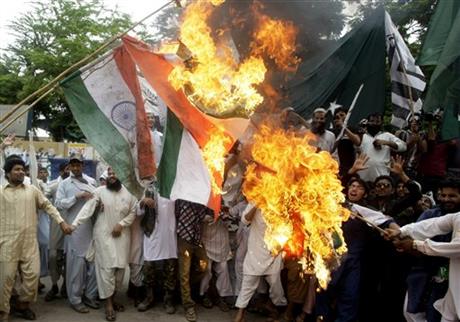
By SEBASTIAN ABBOT
Supporters of Pakistani religious group Jamat-ud-Dawa burn Indian flags at a rally in Karachi, Pakistan, Wednesday, Aug. 14, 2013. The Pakistani military accused Indian troops on Wednesday of carrying out a new round of shelling along the disputed Kashmir border, the latest in a series of allegations of cross-border attacks made by both sides over the last week. (AP Photo/Fareed Khan)
ISLAMABAD (AP) — The Pakistani military accused Indian troops of firing across the disputed Kashmir border Thursday and killing a Pakistani soldier, the second such fatality in recent days as the long-simmering conflict over the mountainous region escalates.
Pakistan and India repeatedly have accused each other of violating a 2003 cease-fire agreement along the border in recent weeks. The violence threatens efforts by the leaders of both countries to improve relations after decades of war and animosity.
The Pakistani military accused Indian troops of carrying out “unprovoked” firing around noon Thursday in the Rakhchakri sector near the town of Rawalakot, killing a low-ranking soldier. The military accused Indian troops of killing an army captain and seriously wounding another soldier Tuesday night.
An Indian army officer said Indian troops responded only after receiving gunfire from Pakistani soldiers, saying the exchange lasted three hours. Pakistani gunfire wounded a woman and a child, said the officer, speaking on condition of anonymity in line with military policy.
The fighting Tuesday night was especially symbolic because it took place in an area along the border called Kargil, where the nuclear-armed rivals fought a bloody three-month conflict in 1999.
Kashmir is divided between Pakistan and India but claimed in its entirety by both. The countries have fought two major wars over the disputed territory since they both gained independence from Britain in 1947.
A 2003 cease-fire agreement largely calmed the Kashmir border. But the two sides occasionally accuse each other of violating it by firing mortars or gunshots. Several soldiers were killed on each side in January in cross-border attacks.
The violence in recent weeks has been more sustained.
It began about two weeks ago when, according to the Indian military, heavily armed militants and Pakistani soldiers crossed the Kashmir border and killed five Indian troops.
The Pakistani military has denied that its soldiers killed any Indian troops and now have accused Indian soldiers of killing two soldiers and a pair of civilians. Five soldiers and eight civilians also have been wounded.
Pakistani Prime Minister Nawaz Sharif has expressed hope that the recent violence wouldn’t derail efforts to improve relations between the two countries. He is especially interested in increasing cross-border trade to jumpstart Pakistan’s economy.
Pakistan’s top defense committee, which Sharif convened Thursday, indicated “all military and diplomatic channels should be used to prevent cease-fire violations.”
“It was emphasized that Pakistan will also continue to seek dialogue and resolution of all outstanding issues with India peacefully,” according to a statement issued by the government after the meeting.
Indian Prime Minister Manmohan Singh has said that ties with Pakistan only could improve once it prevents Islamic militants from using its territory to target India.
India feels Islamabad is not doing enough to rein in the militants. It says the Pakistani military has nurtured the militants to fight a covert war over Kashmir, though Pakistan denies the claim.
The militant group Lashkar-e-Taiba, which has strong historical ties to Pakistani intelligence, is widely blamed for carrying out an attack on the Indian city of Mumbai in 2008 that killed 166 people.
Sharif has shown little inclination to crack down on the group, which is based in his party’s stronghold of Punjab province. A trial of seven Pakistanis suspected of involvement in the Mumbai attack has made little progress.
____
Associated Press writer Aijaz Hussain in Srinagar, India, contributed to this report.


